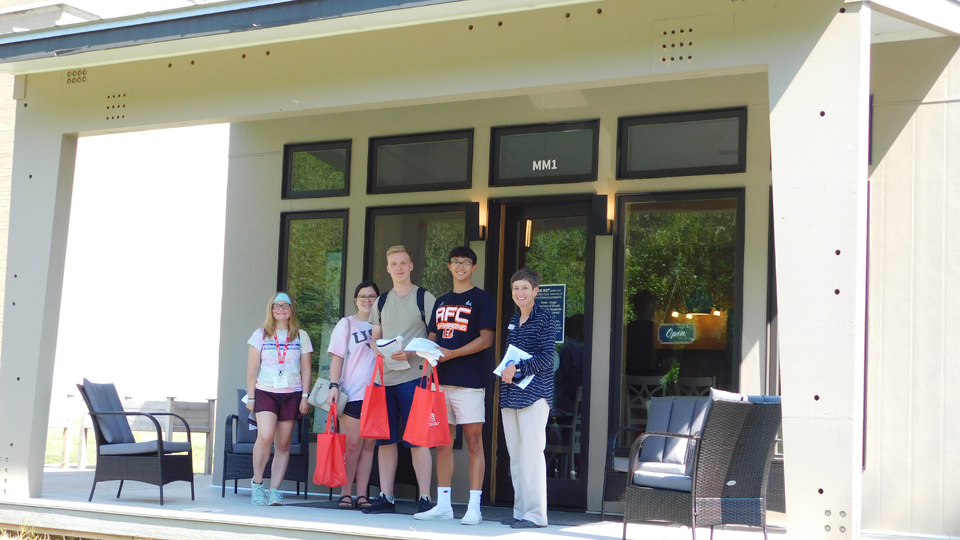$1M gift to USI expands training for dementia care, older adults
Subscriber Benefit
As a subscriber you can listen to articles at work, in the car, or while you work out. Subscribe Now
A $1 million gift is adding muscle to the University of Southern Indiana’s expertise in a segment of healthcare desperate for more workers: older adults. A recent report from the Alzheimer’s Association shows there are currently only 66 geriatricians in Indiana—fewer than one per county—and the state will also need a 37% increase in home health aides by 2028 to meet demand. Boosted by the recent gift, USI says it’s uniquely positioned to not only swell the ranks of healthcare workers in the specialty, but also give Hoosiers a stronger voice in how they want to grow old.
The $1 million gift is from the Sol and Arlene Bronstein Foundation, a philanthropic fund with deep roots in Evansville. $750,000 will establish an endowment, and the remaining $250,000 will support various initiatives in two key areas: dementia care and advance care planning education. Advance care planning involves decisions made ahead of time, such as advance directives, if a person is unable to make decisions due to illness or injury.
Nearly 15 years ago, the school recognized a gap in healthcare amid the nation’s aging population; by 2040, nearly 25% of the U.S. population will be over age 65. The College of Nursing and Health Professions established the Center for Healthy Aging and Wellness in 2008, which has now been renamed the Bronstein Center for Healthy Aging and Wellness.
“There’s a huge need for individuals to step into healthcare, and an even greater need for individuals to step into healthcare with a focus on older adults,” says the center’s director, Dr. Katie Ehlman. “We definitely have a lack of geriatricians, nurses, social workers, case managers and direct care providers who have specialty knowledge in working with older adults. This gift allows us to open the door a little wider, so students can step into and explore gerontology and geriatrics in a way they wouldn’t have if we didn’t have this gift.”
The gift will support five initiatives; among them is an effort to advance artificial intelligence and smart home technology to help people older adults live independently, “which is typically how people want to live—even people with brain change,” says Ehlman.
USI is home to a unique project called the Minka Learning Lab for Living Well, a 600-square-foot smart home showcase for living-in-place that uses integrated technology. For example, the Minka’s bedroom is equipped with a technology that automatically turns on the lights when a person gets out of bed to help prevent falls.
The gift will expand projects taking place at the Minka, such as simulations or research that bring together various departments on campus; engineering students and health profession students are already working together to develop technology for the house. A technology called “Joy” is programmed to offer “joy pops” to a person living with dementia—playing the person’s favorite music or displaying pictures of loved ones.
“We’re beginning to explore artificial intelligence and open the doors for students to think about…can we find ways to create technology to allow people with brain change to live independently?” says Ehlman. “We want to get our students to wrap their hands around that, so when they graduate, they can be thinking of how to create environments where older adults in Indiana and beyond can live independently.”
The gift will also help USI students, as well as local healthcare professionals, earn certifications in dementia care and provide more training for advance care planning. Ehlman says specialized training can help retain care providers for older adults, which is trending down in Indiana; a recent survey showed between 2019 and 2021, the number of registered nurses in the state working in older adult care settings dropped from 7% to only 5.6%.
As the gift expands USI’s efforts, Ehlman believes it’s critical that seniors have a voice—from selecting and testing the technology in the Minka to what kind of care they wish to see.
“I think it’s really important with these initiatives that we keep the older adult at the center and very involved in decision making on what’s important. We’re bringing together future healthcare professionals, current healthcare professionals, faculty, older adults, people with brain change, people without brain change—and we’re learning together how we can improve the lives of older adults in our community,” says Ehlman. “[This gift] opens more doors for students that may lead them to choose careers working with older adults, not only this year, but for many, many years to come.”
Ehlman says, beyond training students, the gift will deepen local expertise by allowing healthcare employees in the region to also earn certifications.
Ehlman says two major pieces of legislation recently passed in Indiana, making the gift even more timely as the state increases its focus on dementia care and advance care planning.
